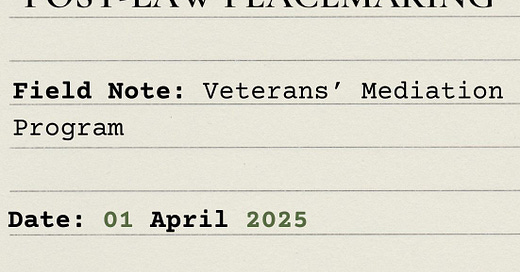Coming to the Table
After nearly 40 years in private commercial legal practice as a solicitor and barrister, I transitioned to a “post-law” practice—focusing on community and values-based pathways for addressing conflict and reaching outcomes that strengthen governance with dignity through relational and ethical engagement.
My work prioritises relationships, ethics, and practical outcomes at the interface of governance and conflict.
The Design Space
One project that I’m honoured to be working on is the design of a pro bono Veterans’ Mediation Program—a structured, values-based pathway for resolving disputes and repairing relationships involving current and former Australian Defence Force members.
The idea for the program emerged in conversations with the Australian Peacekeeper and Peacemaker Veterans' Association following the release of the Royal Commission Report into Defence and Veteran Suicide in September 2024. It appeared there were very few programs that fully responded to the need for safe, respectful, and voluntary processes—ones that acknowledge the distinctive cultural and institutional challenges faced by veterans, particularly during and after their transition from military service.
Objectives
The program is being designed to:
Support resolution of conflicts between veterans and institutions, services, or individuals in the civilian domain;
Provide a calm, structured space where veterans and others can be heard, understood, and supported in finding respectful ways forward—especially when other systems feel overwhelming;
Promote clarity, respect, and self-determination in resolving grievances;
Reduce barriers to help-seeking and improve confidence in resolving conflict outside formal legal channels;
Work towards outcomes that help people feel seen, respected, and reconnected—restoring dignity and honouring each person’s story.
A Design Challenge Framed with “Care”
So, the challenge I’ve set myself is this:
Could we design a kinder, trauma-informed early intervention mediation program—one that supports veterans in navigating conflict and grievance, especially in the civilian domains of post-service life?
And if so, what would that look like—and what might my contribution be?
Thankfully, the Royal Commission Report is rich in material—especially in its attention to transition challenges and the lived experience of veterans. But equally important is the framework I’m using to approach this design: an ethic of care, informed by the work of Joan Tronto and Berenice Fisher.
Critical Questions
Their core questions have become grounding prompts for this work:
What must we be attentive to as mediators and program designers?
What responsibilities do we undertake?
How do we ensure we deliver care competently?
These offer a solid foundation—but the next two questions are more demanding:
How do we foster responsiveness, so that care is not shaped by what we think we’re providing, but by how it is received?
And how might a process built around caring with (Tronto’s fifth element, 2013) help create space for moral repair—moving beyond transactional outcomes to something that grows from restored humanity and connection?
These questions are reshaping how I understand success in mediation—not as compromise or settlement, but as restoration, accompaniment, and ethical presence.
Discovery
It’s slow, layered work—but I’m discovering that this care ethic offers one of the clearest lenses through which to understand post-law mediation in the veterans’ space.
There’s more I could say—especially about hope, risk, and ethical accompaniment in the work, or how I’m applying a human needs theory of conflict—but that may be material for future Field Notes.
References
Fisher, Bernice, and Joan C. Tronto. (1990) “Toward a Feminist Theory of Care.” In Circles of Care: Work and Identity in Women’s Lives, edited by Emily K. Abel and Margaret K. Nelson. State University of New York Press.
Tronto, J. C. (2013). Caring democracy: Markets, equality, and justice. New York: New York University Press.
Tronto, J. C. (2015). Who Cares? How to Reshape a Democratic Politics. Cornell University Press.






Andrew, thank you for sharing your framework and starting point. I am particularly interested in the concept of “caring with” in the context of working with military veterans. The community of veterans we serve seems to resist concepts of rescue and move toward concepts of partnership, or perhaps “working with.” The idea of “caring with” might move even deeper into a sort of collaborative systems thinking? (I have already pulled the Tronto book so I can learn more.)